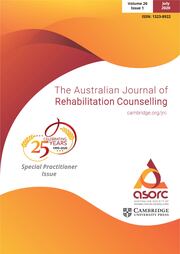No CrossRef data available.
Article contents
Growing Older with an Intellectual Disability
Published online by Cambridge University Press: 27 August 2015
Abstract
Both the life expectancy and numbers of older people with intellectual disabilities are growing. Until recently, ageing with a disability had not been a major consideration for Australian policy makers and service providers. The situation was similar in countries such as the United States of America and United Kingdom where, unlike aged care, disability policy and practice had not evolved to meet needs. Ageing with long standing disability has now been specified by the Australian government as a priority area. This paper reports results of consultations held with consumers, their organisations, service providers and government in order to explore quality of life and service provision issues for people with long standing disabilities. It reports these issues and uses themes emerging from consultations to structure previously published information specifically related to ageing with an intellectual disability. Seven broad themes are discussed which relate to: life experiences; attitudes, skills and knowledge of consumers; attitudes skills and knowledge of community and service providers, the nature of service provision; the ageing of family care givers; financial security; and ageing in place. It is concluded that disadvantages and barriers experienced throughout life influence well being and quality of life in old age.
- Type
- Articles
- Information
- Copyright
- Copyright © Cambridge University Press 2000




